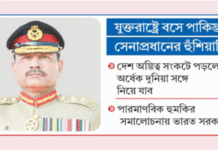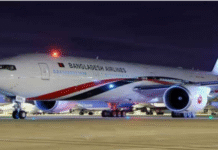It is now time for the Jamaat-e-Islami as a party to be under the scanner for war crimes after its top leaders have been awarded varying sentences for crimes against humanity during the 1971 Liberation War.
The investigation officially began on Monday, said International Crimes Tribunal investigator Motiur Rahman, who is also heading the probe.
Motiur told bdnews24.com, “We will investigate Jamaat’s role as a party during 1971.”
A High Court verdict, amid the ongoing trials of war criminals, announced ‘illegal and void’ the party’s registration on Aug 1.
The probe into the party’s role during Bangladesh’s Liberation War is the next move.

Ghulam Azam, Rao Farman Ali and MA Malek in a meeting in 1971
The Jamaat-e-Islami’s active role against the liberation of Bangladesh was highlighted a multiple times in verdicts against its top leaders.
The ICT-1 verdict that sentenced Jamaat guru Ghulam Azam to 90 years in prison termed the party as a ‘criminal organisation’.
The investigator, who was given the responsibility on Sunday, said, “The probe will investigate Jamaat in that context.”
“We will collect information and evidence. We will try to finish the probe as soon as possible and present the findings to the tribunal.”
The Jamaat had actively opposed the liberation struggle during 1971 but never apologised for their role. Instead, its top leaders repeatedly tried to justify their stand even after Bangladesh’s liberation.
The war crimes tribunal sentenced former Jamaat chief Ghulam Azam to 90 years in prison for conspiring, plotting, instigating and helping to stage crimes against humanity during the 1971 Liberation War.
The tribunal characterised the Jamaat as a ‘criminal organisation’ in the context of this verdict, adding that no anti-liberation element should head any organisation in the country.
The tribunal’s earlier verdicts, too, revealed the Jamaat’s anti-liberation stance and its direct involvement in crimes against humanity.
The Ganajagaran Mancha, demanding capital punishment for war criminals, also sought the Jamaat’s banning for its involvement in war crimes.
The movement of the Mancha, which gathered steam after the verdict against Jamaat leader Abdul Quader Molla, led to an amendment to the law, paving the way for the prosecution of a party when provisions, until then, only allowed the trial of individuals.
The sentencing of the Jamaat leaders such as Delwar Hossain Sayedee, Molla and AHM Kamaruzzaman also contained pointed references to the Jamaat’s involvement in crimes against humanity.
The tribunal observed in its verdict against Azam that it was clear from information gathered and documentary evidence that the Jamaat and its satellite organisations had actively opposed the formation of Bangladesh.
“The Jamaat, led by Ghulam Azam, had operated as a criminal outfit with an ulterior motive, especially during the Bangadesh Liberation War.”
A meeting, attended by Ghulam Azam, Major General Rao Farman Ali Khan and MA Malek, took a position similar to that of Ghulam Azam’s mentor Abul A’la Maududi, who had opposed the formation of Pakistan in 1947. Years later, in 1971 Ghulam Azam chose to walk in his predecessor’s footsteps.
The tribunal observed that the Jamaat had on both occasions failed to feel people’s pulse and attributed its lack of foresight to its radical fundamentalist ideology.
“Even 42 years after Independence, the Jamaat continues to be run by people who are against the country’s independence. As a result, a section of the young attached to the Jamaat are developing a tendency to nurture anti-independence and sectarian sentiments, both of which are a cause for worry before the nation.”
The tribunal further said that there was no shred of evidence to show that those who had opposed the liberation of Bangladesh had changed their mental frame by paying tributes to the martyrs and offering regrets.
The tribunal said in its verdict said that such anti-liberation elements must not be at the helm of government departments, government and private mass organisations, and political parties.
The tribunal also observed that the government was at liberty to adopt measures to prevent anti-liberation elements from holding important posts in such organisation.
Source: Bd news24









